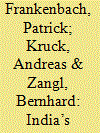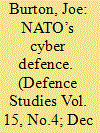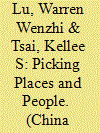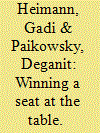| Srl | Item |
| 1 |
ID:
181663


|
|
|
|
|
| Summary/Abstract |
In the mid-2000s, India turned from a nuclear pariah of the international community into a de facto recognized nuclear power. Why and how did this status elevation come about? Realist, liberal, and constructivist perspectives point to important motivations but fail to elucidate the process of India’s (re-)integration. Our strategic cooptation argument conceives of India’s status upgrade as an exchange of institutional privileges for institutional support. To stabilize the nuclear non-proliferation regime, the United States and other nuclear powers offered India the privilege of being recognized as nuclear power—and of taking part in international nuclear trade—in return for India’s promise to provide additional support to the non-proliferation regime. This deal materialized because India was able and willing to provide the needed support and because the institutional setting provided favorable conditions for circumventing and overcoming third-party resistance. We thus establish “strategic cooptation” as a mode of adapting international security institutions.
|
|
|
|
|
|
|
|
|
|
|
|
|
|
|
|
| 2 |
ID:
142257


|
|
|
|
|
| Summary/Abstract |
NATO’s adaptation in the post-cold war era has included a growing role in responding to cyber attacks. This article explores the definitional and theoretical problems in analysing the emerging cyber security field and seeks to provide an outline of the main strategic challenges that cyber attacks pose for NATO. The article evaluates the institutional structures and processes put in place by NATO to confront cyber threats and moves on to explore the extent of transatlantic unity around NATO’s emerging doctrine for cyber defence. It is argued that NATO’s response to cyber security is rooted in its prior adaptation to the changing security environment of the 1990s and the threat from international terrorism post 9-11. More recently, cyber attacks from state and state-sponsored actors have given impetus to NATO’s emerging cyber security doctrine. The article finds that despite recent controversies over cyber surveillance, there is a considerable degree of unity within the alliance on the main cyber security issues. As a multilateral security organisation with a strong institutional foundation, NATO is also relatively well placed to respond to rapidly evolving cyber threats.
|
|
|
|
|
|
|
|
|
|
|
|
|
|
|
|
| 3 |
ID:
183232


|
|
|
|
|
| Summary/Abstract |
China's political system has been characterized by two institutions since the 1980s: an explicit “layer-by-layer administrative hierarchy” and the “appointment of cadres one level down.” There have, however, been two departures from these administrative practices. First, some provinces have “empowered prosperous counties” by placing them in a dual-reporting relationship with both prefecture-level cities and provinces. Second, some provinces have restored personnel control going “two levels down” by appointing key officials at the county and urban district levels of government. These deviations evolved as responses to China's GDP-centric policy environment during the early reform era. Based on field interviews and nationwide analysis of city-level personnel data, this article argues that such adaptations have generated unintended conflicts between provinces and prefecture-level cities. While prior studies of evolutionary change in China highlight the relationship between state and non-state actors, this study demonstrates how interactions among state actors themselves may fundamentally transform the dynamics of administrative governance.
|
|
|
|
|
|
|
|
|
|
|
|
|
|
|
|
| 4 |
ID:
188612


|
|
|
|
|
| Summary/Abstract |
Established powers enjoy privileges in world politics coveted by emerging powers. These privileges vary in their level of institutionalization: full formal privileges, partial formal privileges, and informal privileges. We identify two alternative strategic routes through which emerging powers target these three types of privileges: a top-down and a bottom-up route. We analyze two factors that impact the choice between these two routes: restrictiveness of eligibility criteria for winning privileges, and the expected levels of opposition by both established powers and outsiders. We examine the impact of these factors on two cases in which India negotiated privileges: India’s top-down campaign to win a permanent seat on the UN Security Council; and India’s bottom-up campaign to enter the nuclear club as a de facto nuclear weapon state. Highly restrictive eligibility criteria along with high levels of opposition drove India to gradually seek nuclear privileges through a bottom-up route.
|
|
|
|
|
|
|
|
|
|
|
|
|
|
|
|